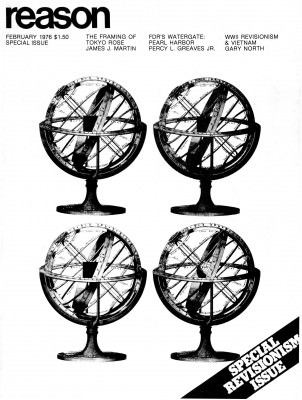Washington Post and Matthew Sheffield Dig a Deeper Hole While Grudgingly Correcting Clumsy Falsehoods About Reason (UPDATED)
Maybe the third time will be the charm for blaming Donald Trump on libertarians


When I dealt with corrections in my first journalism job 30 years ago, at UC Santa Barbara, we hippies used the then-industry-standard practice of quoting the original erroneous material, explaining why it was wrong, then appending at the bottom of every correction this phrase: "The Daily Nexus regrets the error." It may have been formulaic, it may have sounded just a wee bit like a hostage note, but the purpose of the exercise was to snip out the lie like the cancer it was, reinforce the empty space around it with the healing goo of truth, and continue our participation within a culture that holds as aspirational values basic veracity and honesty above all.
The Washington Post's "Post Everything" section, in rightly correcting Matthew Sheffield's embarrassingly inaccurate attempt to draft Reason magazine in a dot-connecting effort to argue that Donald Trump learned his racialized rhetoric "from libertarians," does so not with regret, not with the specificity of its own mistake, not even with a hint of self-reflection, but with a perceptible eyeroll and a willfully misleading sneer:
CORRECTION: An earlier version of this story incorrectly described Reason's 1976 special issue on revisionism and its coverage of apartheid South Africa. It included articles about Holocaust revisionism, but was not entirely dedicated to the Holocaust. Also, while the magazine did run several articles defending apartheid, it did not editorialize in favor of the system.
Let us examine the howling beast that separates the mild wording of the correction from the grave accusations in the original:
There had always been some sympathy for racism and anti-Semitism among libertarians—the movement's house magazine, Reason, dedicated an entire issue in 1976 to Holocaust revisionism and repeatedly editorialized in defense of South Africa's then-segregationist government (though by 2016, the magazine was running articles like "Donald Trump Enables Racism").
So we have been downgraded from "dedicated an entire issue in 1976 to Holocaust revisionism" to "included articles about Holocaust revisionism." But even that latter, lesser formulation suggests multiple missives on a topic that Nick Gillespie in this space has claimed was "not the focus of any of the articles in the issue." Since two does not equal zero, even in DonHill ClinTrump's America, we shall have to go to the tape—or better yet, to the complete, searchable issue in question, followed by my editorial sound effects indicating whether the stories behind the headlines qualify for Sheffield's provocative description:

* "The Framing of 'Tokyo Rose'"–BZZZT!
* "FDR's Watergate: Pearl Harbor"–BZZZT!
* "The Pearl Harbor Cover-Up"–BZZZT!
* "The Sudetan-German Tragedy"–BZZZT!
* "U.S. Interventions: Aberrations or Empire?"–BZZZT!
* "Non-Marxist Theories of Imperialism"–BZZZT!
* "World War II Revisionism and Vietnam"–one paragraph on page 39 within a survey of current historical revisionism that begins on page 34.
Now look back at the Post's correction text again: It included articles about Holocaust revisionism, but was not entirely dedicated to the Holocaust. Nope, there was one paragraph in a 76-page issue pointing to works about Holocaust revisionism, you sarcastic, imprecise aspersion-casters. Using "not entirely" in this case is like saying Rocky was "not entirely" about loan collections. The Post has created yet another error while "correcting" the old, and should correct its correction to reflect that. It's really not that hard to click on the link, fellas.
UPDATE: And now the correction has been updated with a new middle sentence. Gone is "It included articles about Holocaust revisionism, but was not entirely dedicated to the Holocaust," replacing it is "The February 1976 issue included an article that discussed Holocaust revisionism, but it was not entirely dedicated to the subject."
For the record, here is the one paragraph, by the odious Gary North (who was repudiated in the pages of Reason magazine in 1998), in its entirety:
Probably the most far-out materials on World War II revisionism have been the seemingly scholarly studies of the supposed execution of 6 million Jews by Hitler. The anonymous author of The Myth of the Six Million (whose writing style and use of footnotes internal to the text resembles Hoggan's The Myth of the "New History" to a remarkable extent) has presented a solid case against the Establishment's favorite horror story-the supposed moral justification for our entry into the War. (The Myth of the Six Million. [Hollywood: New Christian Crusade Church, 1969]) The untranslated books by the former Buchenwald inmate, Prof. Paul Rassinier, have seriously challenged the story: Le Mensonge d'Ulysse (1949), Ulysse trahi par les Siens (1960), Le Veritable Proces Eichmann (1962), and Le Drame des Juifs European (1964). A recent and very inexpensive book in magazine form, Did Six Million Really Die?, appeared in 1973, written by Richard Harwood. (Surrey, England: Historical Review Press) One thing is certain: 6 million executions or not, we did not intervene when the Soviet Union executed millions of kulaks—the private owners of small farms, prior to their expropriation and liquidation by Stalin in the late 1920's and early 1930's. The kulaks, unfortunately for them, had no supporters writing editorials in the New York Times.
Moving on to South Africa. As I pointed out in my original call for a correction, it wasn't just the assertion that Reason "editorialized in favor of [apartheid]" that was both wildly inaccurate and journalistically jaw-dropping, relying as it did on an accusation by conspiracy theorist Mark Ames, one of the single most discredited journalists working in the English language. It was the modifier repeatedly that Sheffield included in the original but didn't reference in the correction. Reason stood accused—falsely, despite readily available, link-rich evidence to the contrary—of "repeatedly" engaging in behavior it never once committed.
These are the types of errors that a conscientious writer and publication ought to truly regret. Instead, we're still being used to bolster's Sheffield's shaky thesis. Here's the re-written paragraph post-correction, and also post-post-correction (per UPDATE above):
There had always been some sympathy for racism and anti-Semitism among libertarians—the movement's house magazine, Reason, dedicated an entire issue in 1976 to "historical revisionism," including Holocaust revisionism. It also repeatedly ran articles in defense of South Africa's then-segregationist government (though by 2016, the magazine was running articles like "Donald Trump Enables Racism").
A reasonable reader could conclude from this paragraph that Reason went on a multi-decade jag running articles that defended apartheid, and then sometime recently decided that racism was bad, perhaps because it was associated with Donald Trump. In fact—as mentioned when I linked to and described everything Reason wrote about apartheid while that dictatorial system was still alive—South Africa's forcible segregation regime was described in Reason's pages as
"bigoted," "repressive," "thoroughly racist," an "absurd anachronism," "an anathema," "bad for business," and worse. Essayists wrote treatises on "how to dismantle apartheid"; feature writers celebrated developments they hoped "ultimately destroys…apartheid," Editor Robert Poole asked Zulu leader Gatsha Buthelezi questions like "What's the best thing the United States government could do to help end apartheid?", and on and on.

Those quotations come directly from 20 of about 24 articles in pre-'90s Reason that forthrightly assessed South Africa's domestic politics. The other four, which are the only possible materials supporting Sheffield's claim that Reason "repeatedly ran articles in defense of South Africa's then-segregationist government," came from a single author, South African Marc Swanepoel. Unlike Sheffield, who provides as source material a link to Mark Ames (which is considerably worse on the veracity scale than linking to Dan Rather about George W. Bush's Vietnam War experience), I will provide readers to the relevant Swanepoel hyperlinks, from 1973, 1975, 1976, and 1977. To save time for the tendentious reader, the 1975 piece is the worst.
I do not come here to defend Swanepoel, whose conclusions I find to be horrid. But since Sheffield again is making a claim about multiple Reason "articles" being terrible (acting "in defense of South Africa's then-segregationist government," in this case), it is worth pointing out that three of the other four pieces describe the apartheid government thusly: 1) "The less severe dictator"; 2) a "master" of "slaves"; 3) A system that the author "detest[s]." His was a least-worst argument, that—importantly for Sheffield's overall thesis tying libertarianism to racism—Swanepoel at the time acknowledged, rather defensively, would run counter to the prevailing mores of Reason readers.
"Throughout this article I have remained uncritical of the apartheid situation and this may leave me open to some severe criticism from other libertarians," he wrote in 1973. "Readers of this magazine," he added in 1977, "may think me a racist because I seem to condone the actions of the white South African government. Far from it."
In other words, the expected norm within Reason and within libertarianism during the 1970s was to reject racism, in South Africa and elsewhere, a fact borne out by any fair reading through Reason's archive. As Ayn Rand famously said, "Racism is the lowest, most crudely primitive form of collectivism."
It is undoubtedly true, and worthy of exploration, that a handful of people associated with libertarianism (though not at that time or since with Reason magazine) in the late 1980s and early 1990s thought that populist appeals to white working class anger could prove a viable future for certain libertarian ideas. But what's striking about 2016 is that even if those people's rancid electoral theories back then have been proven half-plausible, almost none of them are taking credit for it today. If Donald Trump and Ron Paul "speak the same language," as Sheffield claims, it's a language that doesn't include Paul voting for the GOP nominee. The delegates loudest in opposition to Trump at the Republican National Convention were precisely the most libertarian. And it is surely no coincidence that the nomination of Trump has occurred in the same year as unprecedented polling enthusiasm for the presidential candidate from the Libertarian Party.
Pinning Donald Trump on libertarians was always going to be a stretch. My suggestion to Matthew Sheffield, after he's done modifying his piece yet again, is to start by focusing on Trump supporters in 2016 who still call themselves libertarian, rather than squinting ever harder at some debunked Mark Ames interpretations of material Reason printed long before Sheffield was born.
